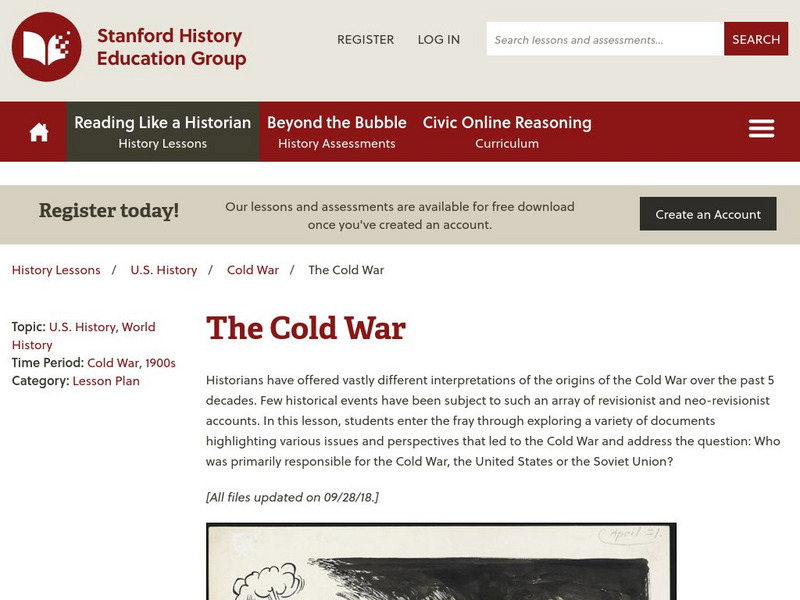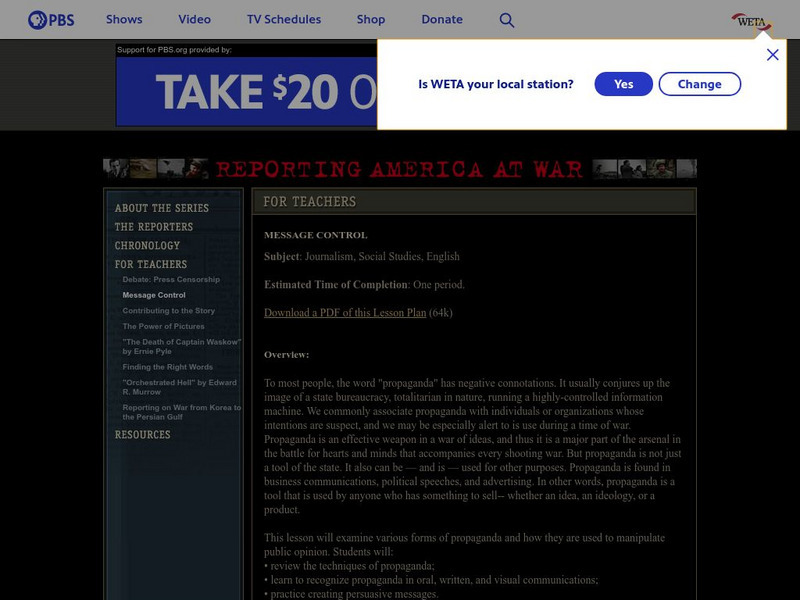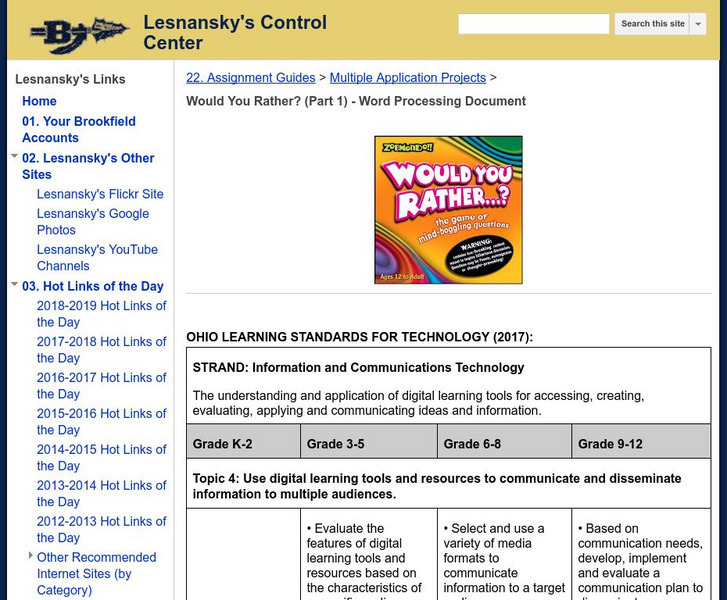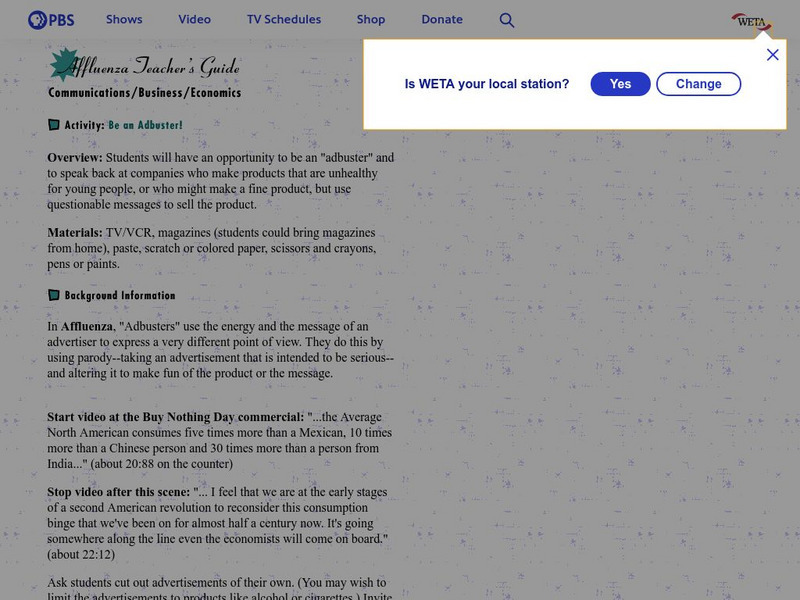Common Sense Media
Common Sense Media: Education: Lesson: Show Respect Online (K 2)
Learners explore the similarities and differences between in-person and online communications, and then learn how to write clear and respectful emails. Requires free membership.
Common Sense Media
Common Sense Media: Education: Lesson: Who Is in Your Online Community?
[Free Registration/Login Required] By learning the Rings of Responsibility, 2nd graders explore how the Internet connects us to people in our community and throughout the world. Help students to think critically about the different ways...
Common Sense Media
Common Sense Media: Education: Lesson: Device Free Moments
[Free Registration/Login Required] In this lesson, 2nd graders learn when it's appropriate to use technology and when it's not, and practice making family rules for device-free time at home. Includes lesson plan, slideshow, student...
PBS
Pbs Learning Media: Spy Techniques of the Revolutionary War: Culper Code Book
Using a primary source and transcript students decipher and create historically-accurate spy communications like those used by George Washington and the Culper Spy ring in the American Revolutionary War.
PBS
Pbs Learning Media: The Zombie Autopsies: The Neuroanatomy of a Zombie
In this instructional activity, students look at the brain of a zombie, and in the process learn about the characteristics of a healthy brain. They take part in a Neurotransmitter Dance Party to learn how neurons communicate. Includes...
PBS
Pbs Learning Media: Arthur: Definition of Cool
Talk with your children about what it means to be cool. Encourage them to realize that being cool means feeling good about your actions and yourself.
New Zealand Ministry of Education
Nz Ministry of Education: Logging Up Reading Mileage
Students will select and enjoy their own range of contemporary and historical texts, display a knowledge of different genre and their particular content, and identify literary aspects of chosen texts for sustained silent reading. They...
Media Smarts
Media Smarts: Lesson: Representing Ourselves Online
In this instructional activity, students talk about dressing up and taking on identities that are similar to or different from them. They are then introduced to the idea of avatars as a kind of "dressing up" inside video games and...
PBS
Pbs Learning Media: Sesame Street: Teeny Tiny Garden Craft
Grow your own garden with this lesson plan. Students will learn about plants while they create their own garden.
PBS
Pbs Learning Media: Sesame Street: Watercolor Butterflies Craft
This website shows students how to make their own watercolors to decorate their butterfly.
Common Sense Media
Common Sense Media: Education: Strong Passwords (3 5)
Learners learn how to create secure passwords in order to protect their private information and accounts online. They learn tips for creating safe passwords. They explore scenarios in which two characters choose passwords, and they use...
Utah Education Network
Uen: Show and Teach
This lesson engages students in classmates sharing their talents. Students will communicate information about their talent and then teach their classmates.
Annenberg Foundation
Annenberg Learner: Analyzing a Project Description
Read the project description for students creating a children's storybook. Analyze the text based on five elements (describe task, achieve authenticity, establish criteria, clarify strategies, communicate rubric).
Other
Western Australia Department of Health: Online vs Face to Face Communication
Students discuss the similarities and differences between online and face-to-face communication. They also research and explore protective strategies to ensure they communicate safely using technology.
Stanford University
Stanford History Education Group: Cold War
[Free Registration/Login Required] A comprehensive social studies unit honing in on the Cold War. Students will rely on various resources covering topics like the Cuban Missile Crisis, Truman and MacArthur, and the Korean War, to analyze...
PBS
Pbs: Message Control (Lesson Plan About Propaganda)
A instructional activity that guides learners through an examination of various forms of propaganda and how propaganda is used to manipulate public opinion. Includes research into the history of propagandistic communications.
Other
Federal Emergency Management Agency: Earthquake Safety Activities [Pdf]
A 74-page booklet of activities that teach about earthquakes and what to expect when one strikes, what one can do to prepare for them, and ways to stay safe during an earthquake and afterwards.
Arizona State University
Arts Work: Communicating Feelings Through Shape & Color
A lesson plan to help students understand the use of symbols and images to express their feelings through their artwork. A great lesson plan to boost students' self esteem. Has a link to a site with examples of Kandinsky's work.
Arizona State University
Arts Work: Communicating Feelings Through Shape & Color
A lesson plan to help students understand the use of symbols and images to express their feelings through their artwork. A great lesson plan to boost students' self esteem. Has a link to a site with examples of Kandinsky's work.
Other
Brookfield High School: Lesnansky's Control Center: Would You Rather? (Part 2)
In this activity, students will create a customized Google Form that will showcase the four dilemmas defined by the game cards from Would You Rather...? and then share the form with others to collect data for analysis. Lots of Would You...
Other
Brookfield High School: Lesnansky's Control Center: Would You Rather? (Part 1)
For this activity, students will create a word processing document that will define four dilemmas in the game cards from Would You Rather? Lots of Would You Rather question examples can be found online. (The Part 2 lesson can be found by...
PBS
Pbs Lesson Plan (Affluenza): Be an Adbuster
Through an integrated approach from PBS, students examine the messages conveyed in print advertisements. Using parody, students are asked to alter the message of an ad to present a different or opposite point of view. Lesson may be more...










